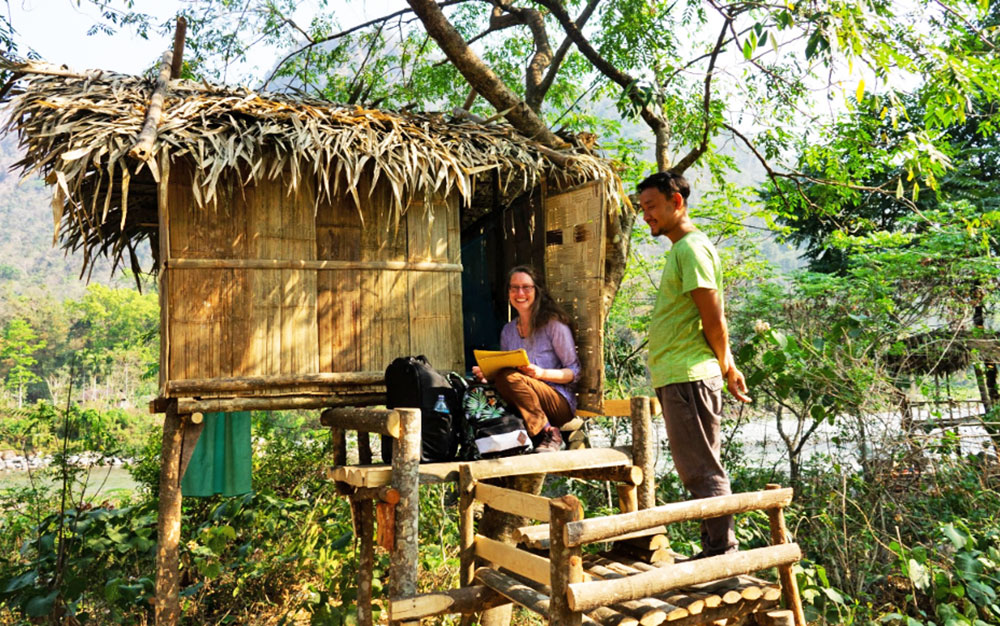Barbara Gerke from Germany is the first guest to visit Jigmechhu after the campsite opened to international tourists earlier this month. She shares her experience with Kuensel’s Choki Wangmo.
Is this your first visit to the country? How are you
connected to Bhutan?
This was my second visit to Bhutan. I attended a conference in 2009. This second visit happened during a time of remarkable transition and innovation for Bhutan with the country welcoming visitors after a long pandemic-related border control. It has been a wonderful and enriching experience.
What was the highlight of your visit?
The highlight of my trip was a weekend getaway to Chukha, which I learnt had just approved its first five homestays. The first night we stayed at Lhamo’s Homestay in Bjabcho, a village that is much lower in altitude than Thimphu, but with a much pleasant and cooler climate throughout the year. The European travelers George Bogle and Samuel Turner journeyed along ancient trails through this region in the 18th century and highlighted its mesmerising beauty. Bjabcho village is famous for its hot-stone baths.
Lhamo and her family gave us such a warm welcome and exceptional hospitality. She heads a local women’s group and has been trained in both hospitality and mushroom cultivation. I was honoured to be her first guest after she set up her homestay in late 2022. The hot-stone bath in a wooden tub infused with artemisia plants was a relaxing highlight after the long journey to her village. The next day we had lunch at the homestay of another outstanding and hospitable woman called Karma Dema in Bongo village, who offered delicious locally made food cooked in a traditional Bhutanese kitchen. By evening, we reached Bjimichu (Jigmechhu), an ecovillage at the confluence of the river Wangchhu and one of its main tributaries, the Bjimichu river, also called Piping River. The site had just opened its doors to foreign tourists. Again, I was honoured to be the first foreign visitor.
How was your experience at Jigmechhu campsite?
We reached Jigmechhu in the evening, and the forest atmosphere enveloped us with unfamiliar and enchanting sounds. A welcoming team of young village entrepreneurs had lit a bonfire and cooked dinner for us. The campsite is located close to several sacred sites associated with great saints in Bhutanese history, and it was a privilege to visit some of the marvelous limestone formations while hiking along the banks of the pristine river. There are several campsites, three with tents and one with bamboo tree huts. We stayed in the tree huts, which were set back in the forest away from the small village. We each got our individual bamboo hut. I was even provided with a mosquito net and an extra blanket. I had the most wondrous night as I drifted into sleep under the bamboo roof with the sound of the river taking me off into dreamlands until the birds woke me up in the morning. Dinner and breakfast included curries made from Vasaka (Adathoda vasica) flowers collected in the forest. The team was very attentive to all our needs. The rustic simplicity of the camp (outdoor toilets and wash facilities) is a part of the travel experience and adds to the atmosphere of staying in the forest on the bank of a himalayan river.
What can be done to improve the campsite services?
Jigmechhu is an untouched place with great development opportunities. Apart from presenting its unspoiled nature, it could be further developed taking its history into account. It lies close to the old trekking route of George Bogle and Samuel Turner who traveled through Bhutan on the way to Tibet in 1773/74. Re-tracing some of those footsteps would make for an interesting hike. The walk to the nearby Padmasambhava cave right at the Bjimichu river also presents itself as a place for a spiritual pilgrimage.
The low altitude of around 190 meters above sea level makes it perfect for a warm winter visit, escaping the colder climate of the mountains. To develop its potential, the team at Jigmechhu could link up with other already established ecotourist places in the country and receive training from already experienced individuals in ecotourism involving international guests. With growing numbers of guests, the team will have to face the challenge of implementing ecological waste management and sustainable tourism as part of their development agenda.
Any comments?
It was encouraging to see that the campsites are managed by groups of young entrepreneurs from the local community supported by dynamic officials from the district administration. As Bhutan seeks to develop its tourism sector together with revitalizing its entire economy, it was remarkable to see how committed development officials in Chukha create an enabling environment for local communities to flourish while preserving their local culture and environment.
For travellers, I recommend combining both the homestays in the enchanting and historic mountain villages with a trip to the Jigmechhu campsite, which together created such a memorable journey, especially thanks to my wonderful local hosts.


